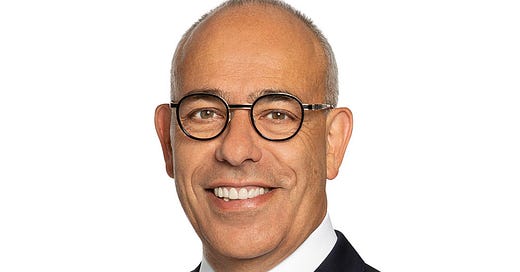Dr. Graham Sher, CEO of Canadian Blood Services Credit: CBS website
Today on Small Change, Kat Lanteigne, co-founder and executive director of BloodWatch.org will be discussing the essential question — why is Canadian Blood Services privatizing plasma, and blood, collection in Canada when the World Health Organization believes every country should be self-sufficient?
In the 1980s, hemophiliacs received Factor VIII treatment that was contaminated with the human immunodeficiency virus (HIV) and Hepatitis C.
The tainted blood scandal forced the industry to re-examine mitigating risk to patients. That included reconsidering the practice of pooling large volumes of blood and plasma from different sources.
An investigation into the tainted blood and plasma supply culminated in the Krever Report (1997) with over 50 recommendations including invoking the Precautionary Principle. That report and its recommendations are still considered the gold standard around the world.
Canadian Blood Services (CBS) became Canada’s blood authority in 1998. In 2022, CBS held backroom meetings with Grifols, a Spanish multinational pharmaceutical and chemical manufacturer and the largest worldwide producer of plasma products.
These discussions would eventually manifest into a public-private partnership (P3) intended to privatize the Canadian plasma supply system. The deal would make CBS a major stakeholder financially profiting from the harvesting and selling of Canadian plasma.
During a 2022 interview I had with Kat Lanteigne, co-founder and executive director of BloodWatch.org, she stated, “fundamentally, the question is and has always been, should we privatize blood collection in Canada? And, should we be making a profit off of Canadian plasma?”
Lanteigne went on to say, “it’s an unconscionable act because [CBS] are a charity. And, that’s getting missed in this discussion.”
Over 40 per cent of the intravenous immune globulin (IV Ig) that is used worldwide is not based on clinical evidence. Even the auditor general of Ontario has determined that plasma products are being over used. Yet, profitability has led to the aggressive, for-profit plasma collection industry.
In 2014, NDP leader and MPP Andrea Horwath – who is now mayor of Hamilton, Ontario – championed the Voluntary Blood Protection Act prohibiting for-profit plasma centres.
This act passed unanimously.
That same year, the Wynne Liberals prevented three paid plasma-collection sites from opening.
Recently, CBS announced that it would be opening paid-plasma collection sites in Hamilton, Cambridge, Whitby and two unnamed locations.
Lanteigne and I discuss the dissonance between Ontario having an established law prohibiting paid-plasma centres and CBS enabling Grifols to open paid-plasma sites across the province. We also discuss the fact that neither Health Minister Sylvia Jones nor Premier Doug Ford have stepped up to shut down these illegal sites before they open.
In the spring, Hamilton Mayor Horwath put forward a motion to have Hamilton designated a ‘paid-plasma-free zone.’ Hamilton city council was to vote on the motion on April 29th. However, the vote was postponed and a new date is still to be announced.
When asked her views on Hamilton becoming a ‘paid-plasma-free zone, independent MPP Sarah Jama told Small Change:
“I agree with Council's decision to prohibit for profit plasma collection centres in Hamilton. My Riding, Hamilton Centre, is the poorest riding in Ontario. A blood-for-money system is dystopian and exists in contrast to everything we all value about our public healthcare system in Ontario.
Offering money for plasma would undermine the great work that the Canadian Blood Services is already doing, and could move us toward a system based on systemic coercion rather than one based on full consent. Those most likely to routinely donate plasma for money would likely be the poorest of people in our communities, doing so because they'd have no other choice.
The World Health Organization says Canada’s blood system should be self-sufficient, should be a public resource, that donors should not be paid for blood, and that access to blood products should be universal and free, which I agree with.”
BloodWatch.org has confirmation in writing from Health Canada that should this illegal contract be carried out, the plasma collected at these sites could be sold on the international market by CBS or Grifols without violating either federal or provincial law. That would undermine the plasma supply chain in Ontario and potentially across Canada.
Europe limits plasma donations to once every two weeks. CBS recommends donating no more than once every seven days. In the U.S. where folks can sell their plasma twice-a-week, over 80 per cent of the plasma is collected from vulnerable, poor and abject poor populations including inmates.
Frequent plasma sellers experience higher rates of lower blood protein levels, increased risk of infection, and liver and kidney problems.
The for-profit plasma industry targets racialized and disadvantaged neighbourhoods drawing from those living with chronic poverty, the unhoused, university students and middle-class families suffering economic hardship.
Selling plasma often becomes an important source of income to make ends meet. However, selling a part of one’s body should never be a viable solution to poverty or part of the Ford government’s poverty reduction strategy.
The World Health Organization (WHO) had a goal to make worldwide blood and plasma donations 100 per cent voluntary by 2020. WHO also believes every country should be working towards self-sufficiency.
Paid plasma collection opens the door to privatizing Canada’s blood supply putting profits before patient needs in the market-driven global environment. That will turn blood and plasma into commodities to be bought by the highest international bidder.
This push for privatization is happening after CBS received $20 million to open 11 plasma donation centers during COVID. Plasma donation rates were so overwhelming that CBS planned 11 additional donation centers.
BloodWatch.org has organized a letter writing campaign and is encouraging Ontarians to contact Health Minister Sylvia Jones, their MPP and MP requesting the Ontario VBPA be upheld.
Hear from survivors who know exactly why Canada needs a moratorium placed on paying for plasma. And, hear Sher state unequivocally that paid collections sites should never open here. Which begs the question, what made Sher change his mind and change course for CBS?
Thanks to everyone who read today’s article and listened to my podcast. With your continued support, a little Nicoll can make a lot of change.
Music: Real Estate by UNIVERSFIELD is licensed under a Attribution 4.0 International License. freemusicarchive.org.
*Be sure to download the Substack app to get the most from your podcast experience.













Share this post